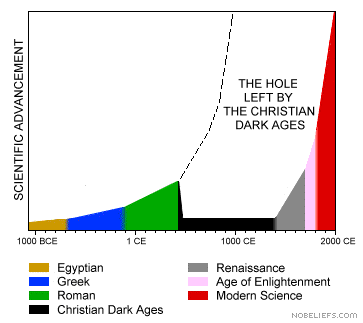Now, nobody can deny that religion has advantages, and nobody can deny that it has, perhaps major, disadvantages.
However, I was thinking about it more fully, and realized how important it truly is. Firstly, so many minor aspects of Western society, including in speech, culture, etc, have traces back to Faith
But this is only minor and perhaps off topic.
Socially,let us discuss the advantages of religion. Firstly, it is a convenient system for establishing morality, and thus, social order. It makes government easier.
But it goes beyond that. By establishing the establishments, it creates common ground within a society, and conformity. To clarify, it gives the people a sense of unity, and therefore perhaps there is more friendliness among them. It also provides convenient answers to great questions, therefore quelling fears and providing reassurance for the living. To put it in a simple sentence, social benefits are that it brings hope, conformity, and establishes lines.
Culturally, the literature, art, music, and tradition associated with religion are obvious, and should not need much explaining. Arguably, having religion within society enhances culture, in that the common people have shared practices.
One of the greatest things that must be realized, is that religious text is quite meaningful and valuable, depending on how you look at it.
Honestly, I think whether or not the stories, myths, etc, found within the religious books are real or not doesn't matter. It's what they represent, what they mean, and therefore religion has a great metaphorical meaning.
The stories within the Bible, even if not real, still have a moral to the story. They have meaning, and they are, of course, beautiful pieces of literature and poetry. In this, if you take religion to be a massive metaphor, it has value. For instance, we can debate the existence of Moses, but what does that accomplish? By closely examining the tale of Moses and his saving the enslaved Hebrews, we can take many moral meanings, lessons, metaphors, etc
God. The greatest problem atheists have is always being materialistic. God may not exist, but God represents something. It represents, perhaps, Nature and Mankind together. It represents that which cannot be controlled or comprehended, but which unites us all.
In this, in the establishments, the literature, and the content, I think there is great value and only the most stubborn atheist would deny this.
Now, disadvantages are also obvious. While I may argue that a society is better off WITH religion, for the reasons I explained, it is only so if the majority belong to that religion. The main disadvantage of religion is that, while establishing what must be established, it does not leave room for other ideas. This, of course, can have many effects from dialogue to war.
I hope you enjoyed that mini article, and please discuss.
Also, I am agnostic, so do not point fingers at me.
However, I was thinking about it more fully, and realized how important it truly is. Firstly, so many minor aspects of Western society, including in speech, culture, etc, have traces back to Faith
But this is only minor and perhaps off topic.
Socially,let us discuss the advantages of religion. Firstly, it is a convenient system for establishing morality, and thus, social order. It makes government easier.
But it goes beyond that. By establishing the establishments, it creates common ground within a society, and conformity. To clarify, it gives the people a sense of unity, and therefore perhaps there is more friendliness among them. It also provides convenient answers to great questions, therefore quelling fears and providing reassurance for the living. To put it in a simple sentence, social benefits are that it brings hope, conformity, and establishes lines.
Culturally, the literature, art, music, and tradition associated with religion are obvious, and should not need much explaining. Arguably, having religion within society enhances culture, in that the common people have shared practices.
One of the greatest things that must be realized, is that religious text is quite meaningful and valuable, depending on how you look at it.
Honestly, I think whether or not the stories, myths, etc, found within the religious books are real or not doesn't matter. It's what they represent, what they mean, and therefore religion has a great metaphorical meaning.
The stories within the Bible, even if not real, still have a moral to the story. They have meaning, and they are, of course, beautiful pieces of literature and poetry. In this, if you take religion to be a massive metaphor, it has value. For instance, we can debate the existence of Moses, but what does that accomplish? By closely examining the tale of Moses and his saving the enslaved Hebrews, we can take many moral meanings, lessons, metaphors, etc
God. The greatest problem atheists have is always being materialistic. God may not exist, but God represents something. It represents, perhaps, Nature and Mankind together. It represents that which cannot be controlled or comprehended, but which unites us all.
In this, in the establishments, the literature, and the content, I think there is great value and only the most stubborn atheist would deny this.
Now, disadvantages are also obvious. While I may argue that a society is better off WITH religion, for the reasons I explained, it is only so if the majority belong to that religion. The main disadvantage of religion is that, while establishing what must be established, it does not leave room for other ideas. This, of course, can have many effects from dialogue to war.
I hope you enjoyed that mini article, and please discuss.
Also, I am agnostic, so do not point fingers at me.

